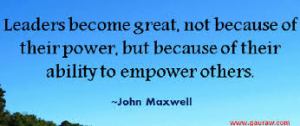My previous blog responded to the question: “Do the best leaders surround themselves with great people, or do they help the people around them become great?” with the answer “both”.
Focusing on the second part of this question, here are 10 common denominators that I’ve observed which help people become great (or at least much better) at what they do:
- EVERYONE understands the company’s Vision, Direction & Purpose
- There are clearly defined roles and responsibilities for every person on the team
- KPI’s (Key Performance Indicators) and SLA’s (Service-Level Agreements) are established with each individual, and agreed to by both the manager & employee
- Actual performance is measured against targets and “score-boarded” for all to see
- Good results receive timely acknowledgement & praise
- Poor results receive timely “coaching” for how to improve going forward
- Employee strengths and opportunity areas are identified & understood
- Strengths are exploited and areas for improvement reinforced
- Ongoing growth & development within the organization is encouraged
- Candid praise & constructive feedback occurs consistently with EVERYONE
Here’s a Leadership Challenge suggestion for you: review each of these 10 items and rate your business on a scale of 1 – 5, with 1 being poor & 5 being great. Then, prioritize your opportunity areas for focused improvement based on the lowest scoring results.




